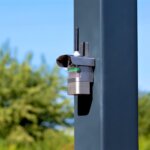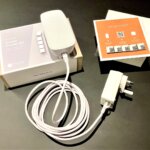Smart IoT devices create hearing wellness platform

|
Getting your Trinity Audio player ready...
|
If you’ve ever walked into a café, bar, or restaurant and then left soon after entering the venue because it was too noisy, you’re not alone. Mumbli – a UK tech start-up – estimates that 86% of 20-40 year olds leave venues because sound levels are too loud. But things could change for the better if the firm’s hearing wellness platform takes off. Mumbli wants to make everyone’s life more peaceful and believes that smart IoT devices could provide the answer.
The company received UK government funding to trial its noise monitoring systems in 2021. And based on the positive feedback from bars, restaurants and patrons, the company is expanding its operations. To fund the activity, Mumbli is preparing a seed round, which includes a campaign on Seeders – a crowdfunding platform.
“With our crowdfunding activity, we plan on expanding Mumbli further from its foundations in East London with a roll out across the capital, as well as Paris and New York,” said Marion Marincat, Mumbli’s founder. “Mumbli will not only benefit people with sensitivity to sound or noise, but will also benefit businesses which are losing a lot of money due to people being unable to spend time in a space with excessive noise.”
Revenue boosting opportunities
The fact that overly noisy venues can dent profits may not be something that business owners are fully aware of. And Mumbli believes that some premises could be losing thousands of pounds every month because they are out of touch with the needs of their clientele. Flipping this around, customers are 76% less likely to leave if the atmosphere inside the venue matches their expectations, according to figures on the firm’s website.
Installing a hearing wellness platform gives business owners the chance to keep track of sound levels and improve their audio surroundings. From a health perspective, long-term exposure to high sound levels is damaging to hearing. Plus, there’s a growing awareness of the negative impact of noise pollution on mental health. Also, with over a billion people worldwide living with hearing challenges, overly noisy spaces are simply making their lives worse.
Mumbli’s IoT device setup features beacons that continuously measure sound levels. And this means that venue operators can quickly see where loud and quiet areas are in their building. What’s more, data from the hearing wellness platform can point towards easy wins, such as moving furniture or adding plants, which may improve a room’s acoustics. Noise alerts, sent through a companion app, can head off complaints and help to protect a venue’s license. And if compliance reports are required, the system could be used to generate necessary data.
IoT sensor detail: Mumbli’s compact noise monitoring devices are similar in size to a take-away coffee cup. Image credit: Mumbli.
API appeal
Through an API, users can link the hearing wellness platform to other systems in the building. For example, the data could be used to automatically adjust the volume of a sound system. There are other opportunities too, such as linking the noise levels to music playlists. As the venue gets busier, the system could trigger sounds that better suit the vibe. Finance teams may want to integrate data into their analytics tools. Doing so would allow them to look for patterns between sound levels and revenue, which could help fine-tune operations.
Companies that get everything right, in terms of meeting sound expectations, get listed on Mumbli’s ‘Certified for Sound Map’ – a searchable list of venues selected for their noise considerations. The online resource features recommended, verified, and live entries, which are mostly clustered around the pilot locations in London. However, as Marincat mentioned, the tech firm has ambitions to bring its technology to many more venues. And the seed funding will help the firm to expand its operations and further develop its hearing wellness platform.
In the gadget world, there’s a lot of interest in noise-canceling technology and headphones with these features are sure to be popular gifts over the holiday season. But the best solution for making the world a more peaceful place, sonically at least, is to address the noise at its source. And smart IoT sensors capable of monitoring sound levels – making their data available in an actionable format – have the potential to change things for the better.
Atmospheric upgrade
Automation means that staff can focus their attention on serving customers and simply adjust sound levels when prompted. Patrons don’t want their cafes, bars, and restaurants to be silent; it’s important that places retain their atmosphere. And Mumbli’s noise monitoring beacons can put a number on that to help set practical upper and lower limits. “Social spaces need to be quiet enough to allow people to have a conversation, but busy enough to be lively and buzzy,” writes the firm.
Larger venues can make themselves even more inclusive by ensuring that there are quieter spaces for customers that need them. Sensors can be placed at multiple locations and information made available in real-time via a dashboard, allowing operators to see where and when it’s quiet. So, next time you are out and about in the city, it might be worth listening out to see whether smart IoT sensors are busy at work optimizing your surroundings.










